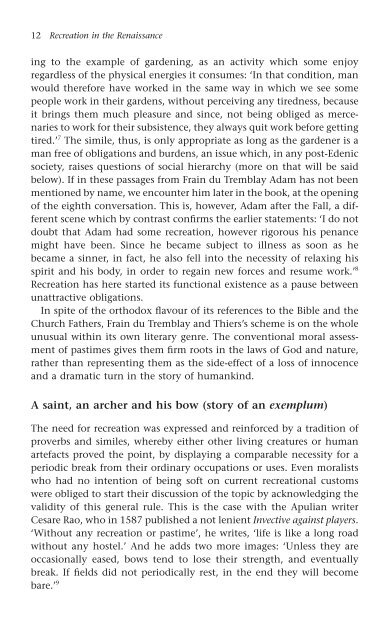Recreation in the Renaissance
Recreation in the Renaissance
Recreation in the Renaissance
- No tags were found...
You also want an ePaper? Increase the reach of your titles
YUMPU automatically turns print PDFs into web optimized ePapers that Google loves.
12 <strong>Recreation</strong> <strong>in</strong> <strong>the</strong> <strong>Renaissance</strong><br />
<strong>in</strong>g to <strong>the</strong> example of garden<strong>in</strong>g, as an activity which some enjoy<br />
regardless of <strong>the</strong> physical energies it consumes: ‘In that condition, man<br />
would <strong>the</strong>refore have worked <strong>in</strong> <strong>the</strong> same way <strong>in</strong> which we see some<br />
people work <strong>in</strong> <strong>the</strong>ir gardens, without perceiv<strong>in</strong>g any tiredness, because<br />
it br<strong>in</strong>gs <strong>the</strong>m much pleasure and s<strong>in</strong>ce, not be<strong>in</strong>g obliged as mercenaries<br />
to work for <strong>the</strong>ir subsistence, <strong>the</strong>y always quit work before gett<strong>in</strong>g<br />
tired.’ 7 The simile, thus, is only appropriate as long as <strong>the</strong> gardener is a<br />
man free of obligations and burdens, an issue which, <strong>in</strong> any post-Edenic<br />
society, raises questions of social hierarchy (more on that will be said<br />
below). If <strong>in</strong> <strong>the</strong>se passages from Fra<strong>in</strong> du Tremblay Adam has not been<br />
mentioned by name, we encounter him later <strong>in</strong> <strong>the</strong> book, at <strong>the</strong> open<strong>in</strong>g<br />
of <strong>the</strong> eighth conversation. This is, however, Adam after <strong>the</strong> Fall, a different<br />
scene which by contrast confirms <strong>the</strong> earlier statements: ‘I do not<br />
doubt that Adam had some recreation, however rigorous his penance<br />
might have been. S<strong>in</strong>ce he became subject to illness as soon as he<br />
became a s<strong>in</strong>ner, <strong>in</strong> fact, he also fell <strong>in</strong>to <strong>the</strong> necessity of relax<strong>in</strong>g his<br />
spirit and his body, <strong>in</strong> order to rega<strong>in</strong> new forces and resume work.’ 8<br />
<strong>Recreation</strong> has here started its functional existence as a pause between<br />
unattractive obligations.<br />
In spite of <strong>the</strong> orthodox flavour of its references to <strong>the</strong> Bible and <strong>the</strong><br />
Church Fa<strong>the</strong>rs, Fra<strong>in</strong> du Tremblay and Thiers’s scheme is on <strong>the</strong> whole<br />
unusual with<strong>in</strong> its own literary genre. The conventional moral assessment<br />
of pastimes gives <strong>the</strong>m firm roots <strong>in</strong> <strong>the</strong> laws of God and nature,<br />
ra<strong>the</strong>r than represent<strong>in</strong>g <strong>the</strong>m as <strong>the</strong> side-effect of a loss of <strong>in</strong>nocence<br />
and a dramatic turn <strong>in</strong> <strong>the</strong> story of humank<strong>in</strong>d.<br />
A sa<strong>in</strong>t, an archer and his bow (story of an exemplum)<br />
The need for recreation was expressed and re<strong>in</strong>forced by a tradition of<br />
proverbs and similes, whereby ei<strong>the</strong>r o<strong>the</strong>r liv<strong>in</strong>g creatures or human<br />
artefacts proved <strong>the</strong> po<strong>in</strong>t, by display<strong>in</strong>g a comparable necessity for a<br />
periodic break from <strong>the</strong>ir ord<strong>in</strong>ary occupations or uses. Even moralists<br />
who had no <strong>in</strong>tention of be<strong>in</strong>g soft on current recreational customs<br />
were obliged to start <strong>the</strong>ir discussion of <strong>the</strong> topic by acknowledg<strong>in</strong>g <strong>the</strong><br />
validity of this general rule. This is <strong>the</strong> case with <strong>the</strong> Apulian writer<br />
Cesare Rao, who <strong>in</strong> 1587 published a not lenient Invective aga<strong>in</strong>st players.<br />
‘Without any recreation or pastime’, he writes, ‘life is like a long road<br />
without any hostel.’ And he adds two more images: ‘Unless <strong>the</strong>y are<br />
occasionally eased, bows tend to lose <strong>the</strong>ir strength, and eventually<br />
break. If fields did not periodically rest, <strong>in</strong> <strong>the</strong> end <strong>the</strong>y will become<br />
bare.’ 9










